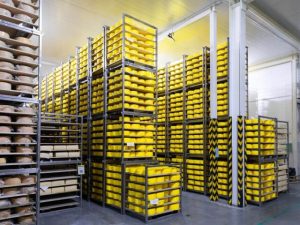Exploring Cold Storage Warehouses: The Backbone of Chill Logistics
Understanding Cold Storage Warehouses
In the realm of logistics, where precision and preservation are paramount, cold storage warehouses stand as indispensable assets. These specialized facilities play a pivotal role in maintaining the integrity and quality of perishable goods throughout the supply chain. But what exactly are cold storage warehouses, and how do they function? Chill Logistics: Exploring Cold Storage Warehouses
What are Cold Storage Warehouses?
Cold storage warehouses, often referred to simply as cold storages, are temperature-controlled facilities designed to store goods that require specific temperature conditions to preserve their quality and extend their shelf life. These facilities are equipped with refrigeration and freezing equipment to maintain temperatures ranging from below freezing to just above room temperature, depending on the requirements of the stored goods.
Functionality and Design
Cold storage warehouses are meticulously designed to create an environment that minimizes temperature fluctuations and ensures consistent cooling throughout the storage space. The layout and construction of these facilities are optimized to maximize storage capacity while facilitating efficient movement of goods in and out of the facility.

The core components of a cold storage warehouse include:
Refrigeration Systems
At the heart of every cold storage warehouse lies its refrigeration system. These systems utilize a combination of compressors, evaporators, condensers, and refrigerants to regulate temperatures within designated storage areas. Advanced temperature monitoring and control systems ensure precise temperature management, critical for preserving the freshness and quality of stored goods.
Insulation
Insulation is essential for minimizing heat transfer into or out of the storage facility. Cold storage warehouses are constructed using specialized insulation materials such as expanded polystyrene (EPS), polyurethane foam, or fiberglass to create a thermal barrier that helps maintain the desired temperature levels.
Storage Racking and Shelving
Efficient storage solutions are vital for maximizing space utilization within cold storage warehouses. Racking and shelving systems are designed to accommodate different types of goods while optimizing accessibility for inventory management and retrieval. These systems are often adjustable to accommodate varying product sizes and storage requirements.
Temperature Monitoring and Control
Temperature monitoring and control systems are integrated into every aspect of cold storage warehouse operations. Sensors placed throughout the facility continuously monitor temperature levels, triggering adjustments to the refrigeration system as needed to maintain optimal conditions. Automated alerts notify personnel of any deviations from set parameters, allowing for immediate intervention to prevent potential spoilage.
Applications of Cold Storage Warehouses
Cold storage warehouses cater to a diverse range of industries and products that require temperature-controlled storage. Some common applications include:
Food and Beverage Industry
One of the primary sectors benefiting from cold storage warehouses is the food and beverage industry. Perishable goods such as fruits, vegetables, dairy products, meat, and seafood require specific temperature conditions to prevent spoilage and maintain freshness from farm to fork. Cold storage warehouses provide the ideal environment for storing these goods at the required temperatures, extending their shelf life and ensuring product quality.
Pharmaceuticals and Biotechnology
The pharmaceutical and biotechnology industries rely on cold storage warehouses to store temperature-sensitive medications, vaccines, and biological samples. Strict temperature control is essential to preserve the efficacy and integrity of these products. Cold storage facilities equipped with temperature monitoring and validation systems ensure compliance with regulatory standards and safeguard the potency of pharmaceuticals throughout the storage period.
Floral Industry
Fresh flowers and plants require careful handling and storage to maintain their appearance and quality. Cold storage warehouses offer the optimal environment for preserving the freshness of cut flowers and extending their vase life. Controlled temperature and humidity levels help slow down the aging process, allowing floral distributors to meet consumer demand for vibrant, long-lasting blooms.
Chemicals and Specialty Products
Certain chemicals and specialty products necessitate controlled temperature storage to prevent degradation or hazardous reactions. Cold storage warehouses provide a secure environment for storing these materials, mitigating the risks associated with temperature fluctuations and ensuring product stability until they are ready for distribution or use.
Advantages of Cold Storage Warehouses
Cold storage warehouses offer several advantages that contribute to the efficiency and reliability of supply chain operations:

Extended Shelf Life
By maintaining optimal temperature conditions, cold storage warehouses extend the shelf life of perishable goods, reducing the risk of spoilage and minimizing product losses. This enables businesses to better manage inventory levels and meet consumer demand without sacrificing quality.
Seasonal Flexibility
Cold storage warehouses provide businesses with the flexibility to store seasonal products during peak harvest times and release them gradually to the market as demand dictates. This helps balance supply and demand throughout the year, ensuring a steady flow of goods to consumers regardless of seasonal fluctuations in production.
Improved Inventory Management
Advanced inventory management systems integrated into cold storage warehouses enable real-time tracking and monitoring of stored goods. This enhances visibility across the supply chain, allowing businesses to optimize inventory levels, minimize stockouts, and streamline order fulfillment processes.
Enhanced Food Safety and Compliance
Compliance with food safety regulations is paramount in the food and beverage industry. Cold storage warehouses adhere to stringent regulatory standards and certifications to ensure the safety and quality of stored food products. Temperature monitoring, sanitation protocols, and traceability measures help mitigate the risk of contamination and ensure compliance with industry regulations.
Conclusion
Cold storage warehouses play a critical role in the preservation and distribution of temperature-sensitive goods across various industries. By providing the ideal environment for storing perishable items, these facilities contribute to the efficiency, safety, and quality of supply chain operations. As technology continues to advance, cold storage warehouses will evolve to meet the ever-changing demands of global logistics, maintaining their status as the backbone of chill logistics.

Recent Comments